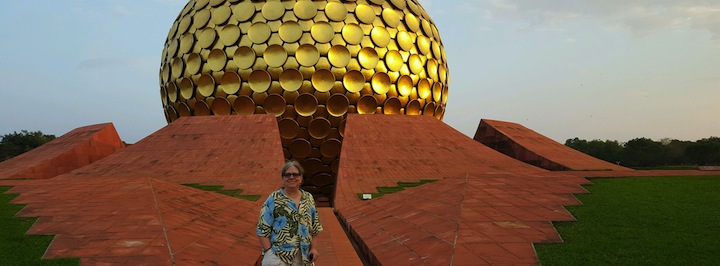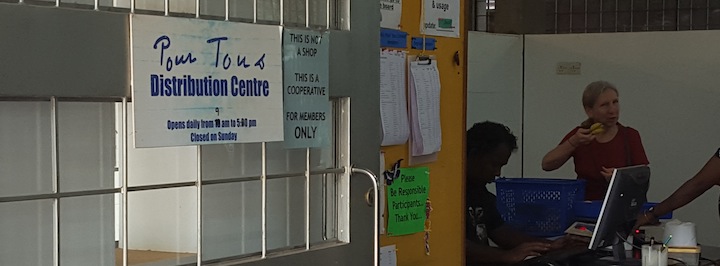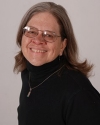Management Professor Journeys to India to Gather Research About Leadership and Relationships in Unique Harmonious Environment

In order to enhance their classroom teaching and publish scholarly articles, professors sometimes take a faculty improvement leave (FIL). Dr. Jane Wheeler, associate professor of management, is using part of her spring semester FIL to trek to Auroville, India, to immerse herself in a unique cultural experience. Her goal is to understand more about the Indian perspective on personal growth, relationships, and leadership development, her areas of research interest in the field of organization development and leadership. She also wants to explore possible opportunities for cross-cultural exchanges between students in Auroville and BGSU students.
Dr. Wheeler believes that self-exploration is the foundation towards leadership potential and that we need to understand ourselves and use that understanding to connect more compassionately with others.
 The BGSU faculty member is working with Auroville’s Social Research Centre to compile interviews about self-exploration and interaction and collaboration among a diversity of people. When the professor returns to BGSU, she plans to write articles about her experiences and share her enriching experiences with her students.
The BGSU faculty member is working with Auroville’s Social Research Centre to compile interviews about self-exploration and interaction and collaboration among a diversity of people. When the professor returns to BGSU, she plans to write articles about her experiences and share her enriching experiences with her students.
Dr. Wheeler’s trip was funded in part by the Hoskins Faculty Study Abroad Award which she was presented this year.
Here is a narrative through the first half of Dr. Wheeler’s immersive cultural experience.
Written by Dr. Jane Wheeler, Associate Professor of Management
My trip to India has surpassed any of my expectations. I have found that the people of Auroville are kind, the sites are beautiful, and the foods are healthy and delicious. Auroville, located in the state of Tamil Nadu, India, is “a universal town where men and women of all countries are able to live in peace and progressive harmony, above all creeds, all politics and all nationalities. The purpose of Auroville is to realize human unity.” It was formed by the Mother 40 years ago when the land was reclaimed from a barren desert.
 My time here is spent working on self-understanding, interviewing residents and compiling material for my study on self-exploration. From time to time, I take part in local ceremonies, and offer some personal coaching.
My time here is spent working on self-understanding, interviewing residents and compiling material for my study on self-exploration. From time to time, I take part in local ceremonies, and offer some personal coaching.
Each morning I go to the Matrimandir for silent reflection. The Matrimandir, “the central force of Auroville,” is an exquisite structure providing one with an unusual intense way to begin the day.
Next, I work on my study, then go to the La Terrace for lunch, then go to the PTDC (Pour Tous Distribution Center) where I have been collecting data for my FIL research project. Auroville’s “economy is based upon no circulation of money”. There are no work contracts which “signifies an emphasis on relations of trust between people, rather than the customary supply and demand in conventional market relationships.” The PTDC is a cooperative where Aurovillians can get food and sundry items without exchanging money.
On Tuesday and Thursday evenings I go to the Unity Pavilion for a workshop on yoga nidra which is a state of consciousness between waking and sleeping. It is a state in which the body is completely relaxed, and the practitioner becomes systematically and increasingly aware of the inner world by following a set of instructions given by the instructor.
Celebrations are important in Auroville. I have attended two tree planting ceremonies where they honor someone who has passed. Then, I enjoyed a visit to the Auroville Institute of Applied Technology (AIAT) where we watched a presentation by two student groups performing both break dancing and a Brazilian dance. Non-violence was the theme for AIAT’s celebration so the dances were interspersed with lectures on non-violence.
Although the structure of Auroville operations is unusual and very different from our capitalistic economy, it does appear to work quite well here. Before coming to live at Auroville, each person commits to work at a job and work on themselves as well. There is an understanding that the goal of the Mother’s Dream for Auroville is a part of the acceptance process of residing here.
This is not the first FIL for Dr. Wheeler. Her leave 10 years ago resulted in two published articles – “Impact of social environments on emotional, social, and cognitive competency” (2008), and “An holistic, organic process of personal growth and leadership” (2013).
Updated: 07/13/2020 02:40PM
